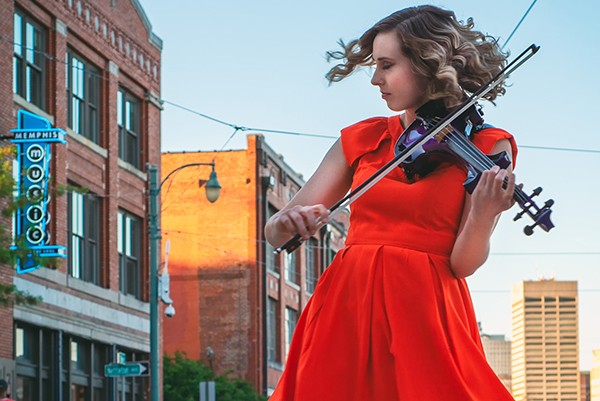Memphis music fans are well acquainted with violinist Alice Hasen, even if they don’t know it. She keeps busy as a member, with Seth Stroud and Walt Busby, of the Blackwater Trio, whose mix of folk and classic rock can frequently be heard at the Dirty Crow Inn or Lafayette’s Music Room. But she’ll become more well-known soon, as she celebrates the release of her first solo album, Violintro, at B-Side on Saturday, September 7th.
Fans of Blackwater’s sounds will be in for a surprise. With Violintro, Hasen gives full rein to her imagination and strives to stretch the boundaries of the fiddle. When I asked her about how the solo album came to be, I found it was the culmination of the lessons she’s learned from living in the South.
Memphis Flyer: Being from Vermont, where you studied classical violin, how did the move to this area affect your music?
 PhotographyMiyabi
PhotographyMiyabi
Alice Hasen: The stripping away of elements to their essence, in either writing or playing, has been one of the main things the South has given me. When I came down to the South, it was initially to Clarksdale, Mississippi. That was a change for me, culturally, but it was straight into the thick of things. Both there and in Memphis, there’s something about the energy of the river, in addition to what’s already here. Just being connected to the heartland, the center of the country. It’s sort of a mystical thing. There’s so much power churning past us right now.
Was relocating here from Clarksdale a challenge?
I’ve been surprised at how much I’ve been able to do here since I moved in 2016. It helped to already be in the South. I don’t think moving to Memphis would have been something I thought of doing otherwise. I wouldn’t have become a professional violinist if I hadn’t come down South. My mother is a flautist in the Vermont Symphony, and she’s influenced me and encouraged me. But she’s also warned me that the life of a musician’s really hard. I majored in music, but I wasn’t confident that I would be a performer. In the classical world, there’s a standard that you have to attain, and there are people that you’re supposed to sound like. Whereas in the non-classical world, you don’t need to sound like somebody else. It’s better if you don’t.
One thing I’ve realized here is that I’m the best at sounding like me. Not trying to do what the prescribed role as a fiddler might be. What I’m doing is off the beaten path of the usual fiddle genres. Everything but the kitchen sink, as it were.
Isn’t there still a bit of the classical aesthetic in your music?
I think so. But what I love doing is keeping the classical technique of intonation and sound, having that as my base pallet, then adding whatever I want. And applying it to genres that are not normally fiddle genres, so rock and jazz and funk and pop. And a little bit of hip-hop and disco on this album. There is one song that’s classical.
How would you distinguish your solo album from the Blackwater Trio?
The trio plays rock and folk, whereas my group is more jazz, funk, pop, and rock. Still coming from a place of rock but with more freedom to stretch the chords to a more jazzy place. Not all the songs are super fiddly, but there’s a violin stamp on everything. Whether it’s a section of classical strings, or a loop, or just a wandering, folksy sort of melody. The thing that binds the album together is an instrument, versus a single genre. So I feel more free to push the envelope, with ‘Where can I take the violin that it hasn’t been taken before?’
And the album artwork is mostly photos of Memphis locations. I’m really proud that there’s a Memphis element in every panel. Little things that, if you’re not from Memphis, you might not know. And a lot of the songs are about the city, too, or people in the city. It’s my homage to the city that’s made me what I am.
Alice Hasen album release show at B-Side, Saturday, September 7th, at 7 p.m.